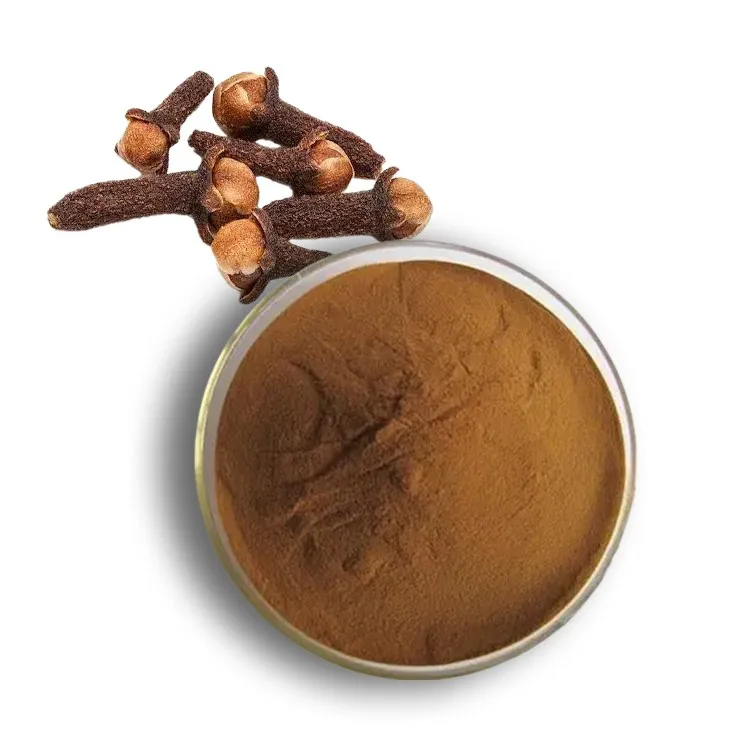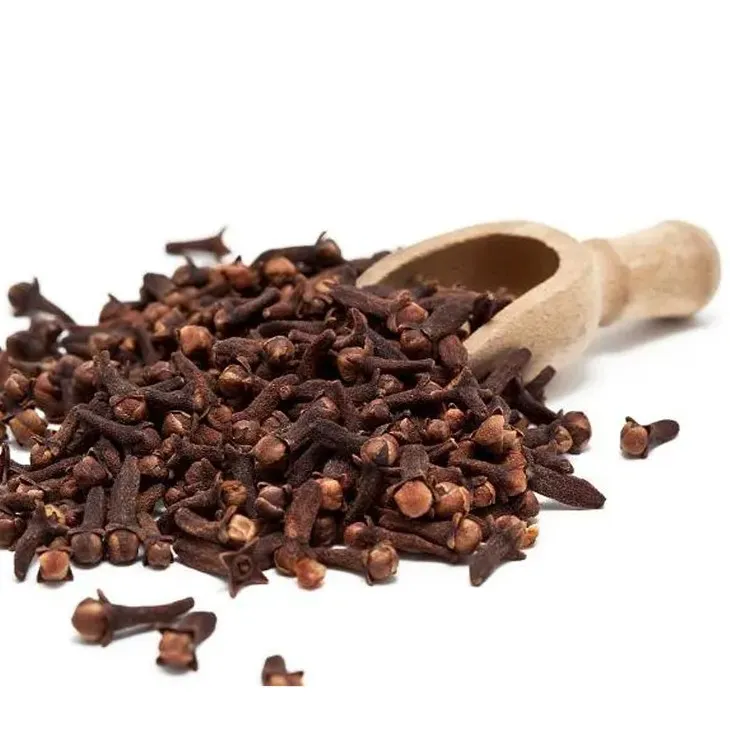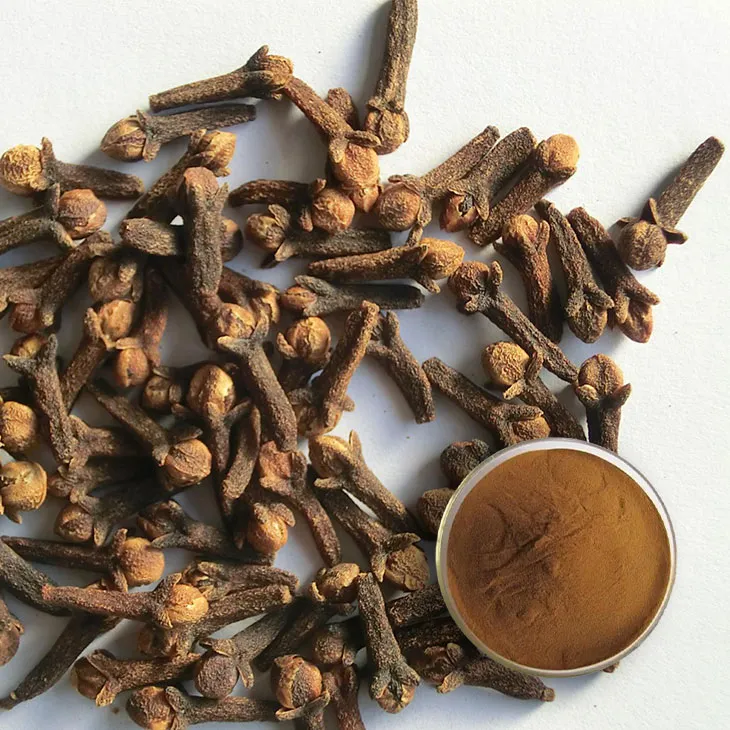- 0086-571-85302990
- sales@greenskybio.com
Clove powder: Their production methods and the reasons for their popularity.
2024-12-18

1. Introduction
Clove Powder is a highly popular spice that has found its way into kitchens around the world. It is derived from cloves, which are the dried flower buds of the Syzygium aromaticum tree. This article will explore the production methods of Clove Powder and the various reasons behind its widespread popularity.

2. Production Methods of Clove Powder
2.1 Selection of High - Quality Cloves
The first and crucial step in the production of clove powder is the selection of high - quality cloves. High - quality cloves are typically those that are plump, firm, and have a rich, dark brown color. These cloves are harvested at the right time when they are fully developed but not over - ripe. The origin of the cloves also plays an important role. Cloves from regions known for their excellent clove production, such as Madagascar, Indonesia, and Sri Lanka, are often preferred due to their superior flavor and aroma.
2.2 Drying Process
Once the cloves are selected, they need to be dried. Drying is a critical step as it helps in preserving the cloves and intensifying their flavor. The cloves are spread out in a well - ventilated area, away from direct sunlight. In some cases, artificial drying methods may be used, especially in large - scale production. The drying process should be carefully monitored to ensure that the cloves do not become moldy or lose their essential oils. It usually takes several days to a few weeks for the cloves to dry completely, depending on the environmental conditions.
2.3 Grinding into Powder
After the cloves are dried, they are ready to be ground into powder. This is typically done using a grinder. Modern industrial grinders can produce a fine and consistent clove powder. However, in some traditional settings, mortar and pestle may still be used. When grinding, it is important to ensure that the cloves are ground to a uniform texture. The fineness of the powder can affect its usability in cooking and its flavor release. A finer powder will generally dissolve or blend more easily in recipes.
2.4 Packaging
Once the clove powder is produced, it needs to be packaged properly. Packaging serves two main purposes: to protect the powder from moisture, air, and light, and to ensure its freshness and quality during storage and transportation. Clove powder is usually packaged in sealed containers, such as jars or pouches. Some manufacturers may also add desiccants to the packaging to further prevent moisture absorption.

3. Reasons for the Popularity of Clove Powder
3.1 Unique Flavor
Clove powder has a distinctive and intense flavor that is both warm and spicy. It adds a depth of flavor to a wide variety of dishes. In sweet recipes, it can provide a rich, aromatic undertone, as seen in baked goods like cinnamon rolls or gingerbread. In savory dishes, it can enhance the flavor of meats, stews, and curries. For example, in a traditional Indian curry, a pinch of clove powder can add a complex and exotic flavor note. The unique flavor of clove powder also makes it a popular ingredient in spice blends, such as garam masala in Indian cuisine or quatre épices in French cuisine.
3.2 Long - Standing Use in Traditional Cuisines
- Clove powder has a long history of use in various traditional cuisines around the world.
- In Asian cuisines, such as Chinese, Indian, and Indonesian, cloves have been used for centuries. In Chinese cuisine, cloves are often used in braised dishes and marinades. In India, they are an integral part of many spice mixes and are used in both vegetarian and non - vegetarian dishes.
- In Middle Eastern cuisines, cloves are used in a variety of meat - based dishes, as well as in traditional desserts. This long - standing use in different cuisines has contributed to its popularity as it has become an expected and beloved flavor in many classic recipes.
3.3 Potential Health Benefits
- Clove powder is believed to have several potential health benefits. It contains compounds such as eugenol, which has antioxidant, anti - inflammatory, and antimicrobial properties.
- Some studies suggest that cloves may help in relieving toothache due to their numbing effect. Eugenol has been used in dentistry for its analgesic properties.
- It may also have a positive impact on digestion. Clove powder can stimulate the production of digestive enzymes, which can aid in the breakdown of food and improve digestion.
- Furthermore, its antioxidant properties may help in protecting the body against oxidative stress and free radical damage.

4. Conclusion
In conclusion, clove powder is a versatile and popular spice with a unique production process. The careful selection of cloves, proper drying, grinding, and packaging all contribute to the production of high - quality clove powder. Its popularity can be attributed to its distinct flavor, long - standing use in traditional cuisines, and potential health benefits. Whether it is used in a sweet dessert or a savory main course, clove powder continues to be a favorite ingredient in kitchens worldwide.
FAQ:
What are the main steps in the production of clove powder?
The production of clove powder mainly involves several steps. First, high - quality cloves need to be carefully selected. These cloves should be intact, without obvious damage or mold. Then, the selected cloves are usually washed to remove impurities. After that, they are dried thoroughly. Drying can be done through natural drying or using drying equipment to ensure that the moisture content is low enough. Finally, the dried cloves are ground into a fine powder. This can be achieved by using a grinder or other grinding devices.
How does the unique flavor of clove powder enhance dishes?
Clove powder has a warm, sweet, and slightly spicy flavor. In savory dishes, it can add a depth of flavor and complexity. For example, in meat dishes like stews or braised meats, it can penetrate into the meat, masking any unpleasant odors and enhancing the overall savory taste. In sweet dishes, such as cakes or puddings, its warm and sweet notes can complement the sweetness of other ingredients, creating a more rich and indulgent flavor profile.
What are the traditional cuisines that often use clove powder?
Clove powder has a long - standing use in many traditional cuisines. In Indian cuisine, it is a common ingredient in various curries, biryanis, and spice blends. In Middle Eastern cuisine, it is used in meat - based dishes, as well as in some traditional desserts. In European cuisine, particularly in countries like France and the UK, it can be found in mulled wines, certain baked goods, and pickled products.
What are the potential health benefits of clove powder?
Clove powder may have several potential health benefits. It contains antioxidants, which can help fight against free radicals in the body and potentially reduce the risk of chronic diseases. It also has antimicrobial properties, which may help in preventing the growth of certain bacteria and fungi. Additionally, some studies suggest that it may have anti - inflammatory effects and could potentially aid in digestion.
How can one ensure the quality of clove powder?
To ensure the quality of clove powder, start with the source. Purchase cloves from reliable suppliers. When examining the powder, it should have a strong, characteristic aroma of cloves. The color should be a consistent brownish - tan. There should be no signs of moisture, such as clumping. Additionally, if possible, check for any certificates or quality assurances provided by the manufacturer.
Related literature
- The Production and Quality Control of Spices: Focus on Clove Powder"
- "Clove Powder in Culinary Traditions: A Global Perspective"
- "Health - Promoting Properties of Clove - Derived Products, including Clove Powder"
- ▶ Hesperidin
- ▶ citrus bioflavonoids
- ▶ plant extract
- ▶ lycopene
- ▶ Diosmin
- ▶ Grape seed extract
- ▶ Sea buckthorn Juice Powder
- ▶ Beetroot powder
- ▶ Hops Extract
- ▶ Artichoke Extract
- ▶ Reishi mushroom extract
- ▶ Astaxanthin
- ▶ Green Tea Extract
- ▶ Curcumin Extract
- ▶ Horse Chestnut Extract
- ▶ Other Problems
- ▶ Boswellia Serrata Extract
- ▶ Resveratrol Extract
- ▶ Marigold Extract
- ▶ Grape Leaf Extract
- ▶ blog3
- ▶ blog4
- ▶ blog5
-
Pure 85% Tomentil Extract.
2024-12-18
-
Curcumin Extract
2024-12-18
-
Cassia Seed Extract
2024-12-18
-
Cat Claw Extract
2024-12-18
-
Camu Camu Extract
2024-12-18
-
Dandelion Leaf Extract
2024-12-18
-
Coix Seed Extract
2024-12-18
-
Cranberry Extract
2024-12-18
-
Lavender Extract
2024-12-18
-
American Ginseng Root Extract
2024-12-18
-
Alfalfa Meal
2024-12-18





















